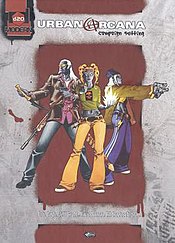Urban Arcana

The Urban Arcana Campaign Setting
|
|
| Designer(s) | Bill Slavicsek, Jeff Grubb, Eric Cagle, Dave Noonan, Stan! |
|---|---|
| Publisher(s) | Wizards of the Coast |
| Publication date | 2003 |
| Genre(s) | Modern Fantasy |
| System(s) | d20 system, modified (d20 Modern) |
Urban Arcana is a campaign setting for the d20 Modern roleplaying game that builds on a small campaign model included in the original rulebook. It adds much in the way of magic and monsters to the game, and contains rules for things such as playing Shadowkind characters.
The core book for Wizards of the Coast's d20 Modern Roleplaying Game (2002) included "Urban Arcana", a modern fantasy setting. Wizards later developed one of d20 Modern's settings into a full sourcebook: the Urban Arcana Campaign Setting (2003).
In the world of Urban Arcana, dragons rule the boardrooms and bugbears rule the streets. It is a world where monsters and magic exist, yet the human psyche just cannot fathom them and covers up all supernatural events. Some, however, break that barrier and become aware of the world around them and help Mages, Acolytes, and other magical characters fight with monsters from another realm.
This game takes modern adventures and combines it with a chaotic twist of magic, using creatures and spells familiar to those who play Dungeons & Dragons. The setting is simply Earth as we know it. Slowly creatures from another world, where magic and fantasy rules, have moved into ours. They are hidden by the human subconscious which disbelieves seeing horns on people's heads or monsters in the subway.
Urban Arcana's story varies from GM to GM, but they usually share these common factors. Urban Arcana takes place on Earth, or a slight variation of it. Ever since the dawn of time, creatures from another world have been appearing on Earth due to a force called Shadow. Creatures such as Elves, Kobolds, Gnoll, Aasimar, and others have inhabited earth for years, with no memory of the world they came from due to "The Gift of Lethe". They have always assimilated into human society because most "Mundane" or normal humans believe them to be fictional, and therefore see them as other mundanes. This is helped along by the fact that the Common tongue of D&D is always identical to the language of the area that they appear in (A sort of Deus Ex Machina to over come language barriers). In recent years however, Shadow activity has increased, with an influx of new Shadowkind appearing. The reason for this varies from campaign to campaign, some times never being explained at all. This has resulted in the formation of various organizations.
...
Wikipedia
